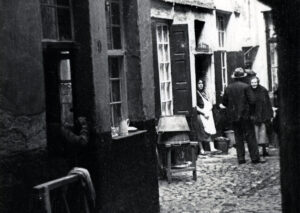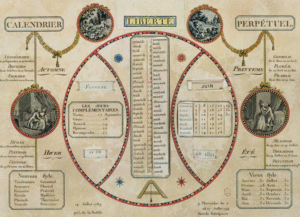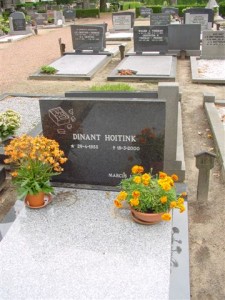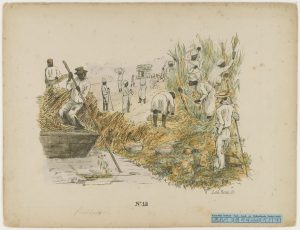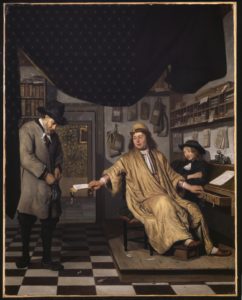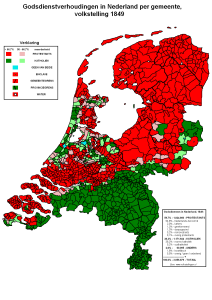Openbaarheidsbeperking means a limitation on the public availability; an access restriction. You may come across the term in finding aids or archival descriptions. Under the Archiefwet [Archive Law] of 1995, records created by the government are public, and access can only be restricted on three grounds: Privacy of living people, The interests of the real or its allies, Disproportionate disadvantage for another reason. Repositories can also refuse access to original records if … [Read more...]
Dutch term – Slop
A slop is a slum, a neighborhood with low quality housing. In some cities, like The Hague, the word slop was used for a particular little type of slum, a small alley in between main streets, lined with cheap housing. During the 1800s, many cities grew dramatically. Factories offered jobs, and drew many people from the countryside to the cities. Housing could not keep up with demand, and every little bit of space was used for housing. … [Read more...]
Dutch term – Fructidor
Thermidor was the twelfth month in the French Republican calendar, the second month of summer. It started on 18 August (1795-1799) or 19 August (1800-1805). The French Republican calendar was in use in the Netherlands between 1795 and 1813. You may come across the French names of the months in governement records in this period, such as civil registration records. … [Read more...]
Dutch Term – Grafsteen
A grafsteen is a gravestone. This is the grave of my uncle Dinant Hoitink, which shows his favorite toy. I wrote about him in my blog post about researching relatives with disabilities. In the Netherlands, graves are routinely cleared after a few decades, so we may usually only be able to find gravestones of more recent ancestors. Whether a grave survives depends on the space the cemetery has. To find a grave, check out these Dutch alternatives to Find a Grave. … [Read more...]
Dutch term – Thermidor
Thermidor was the eleventh month in the French Republican calendar, the second month of summer. It started on 19 July (1795-1799) or 20 July (1800-1805). It was derived from the Greek word θερμός (thermos), meaning heat. The French Republican calendar was in use in the Netherlands between 1795 and 1813. You may come across the French names of the months in governement records in this period, such as civil registration records. … [Read more...]
Dutch term – Publieke Vrouw
Publieke vrouw (literally: public woman) is a term for prostitute you may come across in records in the 1800s and 1900s. For most of this period, prostitution was legal. You may find publieke vrouw as the occupation in population registers or other records, though in many cases, the occupation of such women was left blank. In some cases, it can be inferred from other sources, such as witness statements or hospital records. For more information about researching prostitutes see Looking for … [Read more...]
Dutch term – Slaaf
Slaaf is the Dutch word for slave. On 1 July 1863, slavery was abolished in the Dutch colonies of Suriname and the Netherlands Antilles. In practice, the enslaved people were bound to work for their former enslavers for another ten years, to ease the transition. The owners received compensation for the loss of their chattel. The National Archives of the Netherlands has several indexed sources regarding enslaved people, including manumission records. … [Read more...]
Dutch Term – Procuratie
A procuratie is a power of attorney. You may come across procuraties in court or notarial records. Emigrants sometimes gave a procuratie to handle their business in the old country, like buying merchandise, claiming an inheritance, or getting paid for an outstanding debt. … [Read more...]
Dutch term – non-binair, hen, die, diegene
Since 2018, it has been possible for non-binary people in the Netherlands to have an "X" in their passport instead of "M" (man/male) or "V" (vrouw/female). People have to be at least sixteen years old to choose to register as non-binary. You will not find non-binary people mentioned as such in official records before 2018. Dutch does not have a widely accepted pronouns for non-binary people. Some people prefer "hen," the Dutch version of "they," used with the third person singular verb … [Read more...]
Dutch term – Godsdienst
Godsdienst is the Dutch term for religion. Knowing the religion of your ancestors is especially important before the introduction of the civil registration (in 1811 in most parts of the Netherlands). Since 1811, the civil authorities have kept records of births, marriages, and deaths, but before that period, church records are the primary sources for vital information. Since the Reformation in the late 1500s, most people in the northern parts of the Netherlands have been Dutch Reformed. In … [Read more...]
